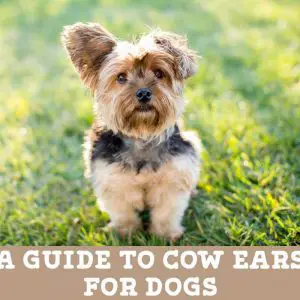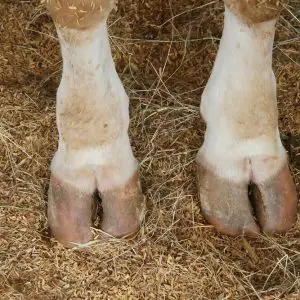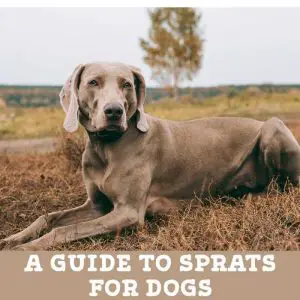Are you looking for a natural chew for your dog? Maybe something that is nutritious and has some health benefits too? Or maybe you’re looking for a chew which will distract your dog for ages, keeping him entertained and happy? Beef tendons may be the right chew for you!
In this article we will investigate how beef tendons are made, if they’re safe for your dog, and how they might benefit your dog’s health.
Key facts
Beef tendons are healthy, high in protein and low in fat.
Beef tendons help improve dental health, joint health, and mental health for anxious and busy dogs.
Beef tendons are long-lasting chews, which can be given to any dog of any size older than 16 weeks. They are particularly helpful in aiding puppies with teething discomforts.
Beef tendons are generally very safe, but as with all hard chews, you should take them away when they are small enough to swallow whole, to prevent it getting stuck in the throat.
A few great alternatives to beef tendons include ostrich tendons, bully sticks and chicken feet.
What Are Beef Tendons?
Beef tendon chews are 100% natural dried beef tendons. They are usually taken from the Achilles tendon of a cow, but any long thick tendon can be used.
They can be sourced from all over the world, however in Europe, Turkey seems to be one of the main producers of beef tendon chews for dogs. They are by-products of the meat industry, and would have been discarded or minced up into dog food had they not been harvested for tendons.
Tendons are usually quite large, at six to ten inches long, and either air-dried or dehydrated with heat. Some tendons are wood-smoked to add extra flavouring, but this is unnecessary as dogs love them just as they are.
Most tendons look relatively natural, but they can be dried into a twisted shape or plaited together with another tendon or two. These twists and turns can be beneficial when it comes to abrasion against the teeth to improve the effectiveness of teeth cleaning.
Benefits of Beef Tendons for Dogs
Beef tendons are nutritious, low-fat chews for dogs which help improve dental health, as well as mental health, by providing plenty of chewing time. They also contain glucosamine and chondroitin which helps to improve joint health.
Key benefits
Mental Health
Beef tendons can provide a few hours of enjoyable chewing which releases endorphins.
Dental Health
Beef tendons fray as they are chewed and the fibres have an abrasive, cleaning effect.
Joint Health
Beef tendons contain glucosamine and chondroitin which are linked to cartilage production and improved joint fluid.
Mental Health
Beef tendons are tough to chew through, and will keep your dog entertained for hours. Constant chewing stimulates the release of endorphins; natural compounds which help your dog feel happy and relaxed. Coupled with the hour or two of distraction that a beef tendon will provide your dog, they are ideal to improve your dog’s mental health, especially if they are a worrier, suffer from separation anxiety, or need some distraction through a thunderstorm or fireworks display.
Dental Health
Also, chewing through tendons helps improve your dog’s dental health. The chewing action provides abrasion against the teeth, resulting in less plaque build-up and cleaner teeth.
Joint Health
Beef tendons are full of connective tissue. This is high in protein and low in fat, and also naturally contains glucosamine and chondroitin. These compounds have been scientifically proven to improve joint cartilage health of osteoarthritic dogs. Glucosamine and chondroitin are precursors for cartilage, and stimulate the production of glucosaminoglycans (GAGs) which make up cartilage. They also improve joint fluid through stimulating the production of hyaluronic acid.
However, there is a variable amount of glucosamine and chondroitin in each individual product, and it is unlikely to be sufficient to make enough of a difference alone. Therefore, joint supplements are a superior option to ensure your dog is provided with a clinically relevant dose of the compounds. It’s also important to remember that neither supplements or beef tendon chews are substitutes for taking your dog to the vet to receive treatment when he is uncomfortable.
Nutritional Information for Beef Tendons
Beef tendons are also highly nutritious. As already mentioned are high in protein and low in fat, making them excellent choices for dogs which are overweight. The average guaranteed analysis is:
Nutrition
Protein is an integral part of your dog’s diet and helps keep muscles strong, as well as synthesise DNA and hormones. A dog’s diet should be made up of predominantly protein, so beef tendons contribute to it very well.
40 Kilocalories per Chew
Beef tendons are low in fat and low in calories, enabling you to feel guilt free about giving them to your dog. However it doesn’t mean they are completely fat-free, so remember to take a small amount of food away from your dog’s daily ration to make up for eating a beef tendon.
Feeding Guide
Given all the benefits, you’ll probably want to give them as regularly as possible. Well the good news is, medium and large dogs can have a beef tendon daily. Smaller dogs shouldn’t have more than five a week, as beef tendons are quite large, but you can break or saw them in half and give your smaller dog a chew daily if you wish.
Disadvantages & Risks of Beef Tendons for Dogs
A Very Safe Treat
You can feed beef tendons often with virtually no risk. Just be sure to remove the last piece (especially if your dog is a gulper) to reduce the risk of choking.
There are very few risks associated with beef tendons, however, as with all treats which are tough, you should take it away when it becomes small enough to swallow whole (especially if your dog is a gulper!). This will prevent your dog from choking on the last bit of the treat.
But generally, beef tendons are easily digestible, so as long as it makes it to the stomach, it should be broken down by the stomach acid and pass through the rest of the intestines with no issues.
There are very few cases where you have to avoid giving your dog beef tendons. Naturally, if your dog is allergic to beef, they are not a good idea as they are full of beef protein. But otherwise, they are suitable for all dog breeds of all shapes, sizes and most ages.
Beef Tendons for Puppies

Puppies can be given beef tendons from 16 weeks of age. They are perfect for distracting bitey puppies when they go through their crocodile phase! They also help relieve those itchy gums when your puppy loses his baby teeth to be replaced by adult teeth around six months old.
Alternatives to Beef Tendons
Like the sound of beef tendons but not quite sold on them? Why not try one of these alternatives?
- Ostrich tendons: Like beef tendons, they are high in protein and low in fat, and last a long time for even strong chewers. As they soften, they fray into small fibres, which act like floss for even further improved dental health.
- Bully sticks: Bully sticks are made from dried beef penis. It might sound awful, but your dog is sure to love it. One of the reasons for that is because they stink! But if you can get past the odour, bully sticks are great for improving dental health and provide plenty of chewing time. They are very high in calories though, so are not suitable for overweight dogs.
- Chicken feet: If you’re looking for something else which helps your dog improve their joint health, chicken feet are a good alternative. They contain all the tendons of the lower leg, and as a result, plenty of natural glucosamine and chondroitin. However, they are often gone in a couple of crunches so won’t keep your dog busy for long.
FAQs
Beef tendons are nutritious, low-fat chews for dogs which help improve dental health, as well as mental health, by providing plenty of chewing time. They also contain glucosamine and chondroitin which helps to improve joint health.
There are very few risks associated with beef tendons, however, as with all treats which are tough, you should take it away when it becomes small enough to swallow whole (especially if your dog is a gulper!). This will prevent your dog from choking on the last bit of the treat.
Since beef tendons are low in fat, they aren’t greasy, and shouldn’t leave marks on your floor or carpets. In addition to this, they aren’t particularly smelly either. That doesn’t mean they are odour-free; all natural products have some sort of smell to them (your dog wouldn’t be very interested if they didn’t!). But as for chews in general, these are relatively pleasant to have in the house.
All new food products, if not introduced slowly, can cause diarrhoea. However, this is more likely to happen with fatty foods, of which tendons are not. So the likelihood of your dog developing diarrhoea from tendons is very small as long as you introduce them to your dog’s diet gradually.
It’s unlikely for a beef tendon to cause a blockage as tendons are entirely digestible. This means the stomach acid easily breaks them down. However, they are hard, and therefore if your dog swallowed a very large chunk whole, which wasn’t able to pass to the stomach, it could cause a blockage in the throat.
This can be avoided by taking away the last bit when it gets small enough to swallow, and supervising your dog at all times when they have a chew.
Beef tendons are harvested from slaughtered cows at the abattoir which have been raised for meat. They are a by-product of the industry which might otherwise go to waste.
In the UK, meat product traceability is usually quite good, so it is a good idea to be on the look-out for beef tendons which have come from organic British cows. This ensures they will have had the best welfare. However, most beef tendons are imported from mainland Europe, specifically Turkey, and therefore you might have to do some research to determine what sort of welfare the cow has had.
Medium and large dogs can have a beef tendon daily. Smaller dogs shouldn’t have more than five a week, as beef tendons are quite large.
How long beef tendons last depends on a number of factors, including how big your dog is and how vigorous a chewer they are. But they are fairly tough so your dog can probably get an hour or two chew time out of them.









